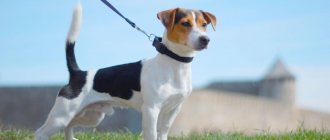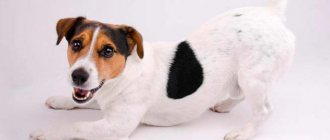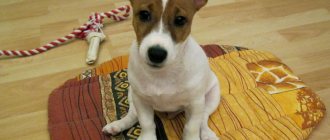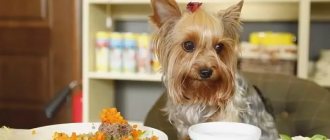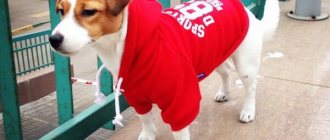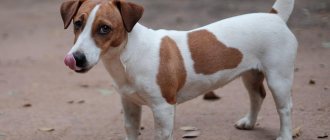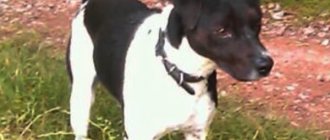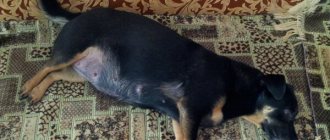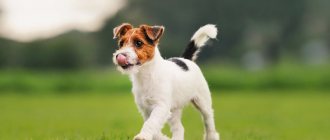Jack Russell Terriers are hunting dogs with great energy, a lively character and a love of active pastime.
That is why feeding is one of the main stages of proper care for these dogs.
They need a special diet.
It must fit their lifestyle and replenish vitality.
Let's figure out what is best to choose for your pet.
Natural food or dry food?
Choosing a place and utensils for feeding the puppy
The mobility of the rock causes problems with selecting a suitable corner; the main requirements for placement include:
- easy accessibility;
- ease of cleaning;
- a place where no one will disturb the pet.
Jack Russell Terrier
In a small apartment, bowls are placed in the kitchen; the volume of dishes must correspond to two norms for one-time feeding. It should be made of food-grade materials, lightweight, and easy to clean.
Important! For Jack Russell puppies, special pedestals and risers for bowls are not provided.
Water in a Jack Russell puppy's diet
Training a Jack Russell Terrier at home on your own
Drinking water should be freely available, especially when using industrial biscuits or during high physical activity.
Important! Excessive or minimal fluid intake is a reason to consult a veterinarian.
A bowl of water is required near the dry food.
How to educate?
Raising small dogs is just as important as raising large ones.
Especially if we are talking about a hunting dog who is ready to recognize your kata as game. These dogs are very smart and learn everything literally on the fly. The main thing is to find the right approach to training.
It should be noted that the training process is so easy with these pets that even a child of reasonable age can cope with it. Along with intelligence, they are also endowed with cunning. This means that you will encounter many tricks to circumvent prohibitions and commit mischief.
Jack's mischief directly depends on the physical activity available to him. A terrier that has run and played enough sleeps like a baby and behaves like an angel, but locked within the four walls of a city apartment turns into a real punishment.
Our heroes are perfect both as a companion and as a family pet. They get along with children and gladly accept the rules of the game, run around, have fun and delight the child with their positive attitude. A versatile dog, endowed with many advantages, is always open to communication with people.
RAW power system
Feeding refers to natural programs, which are based on:
- bones and raw meat;
- offal;
- fish products - preference is given to marine life.
Jack Russell Terrier: care and maintenance at home
80% of the diet consists of lean meat, 10% - offal (a third is liver), 10% - bones with a meat layer.
The positive aspects of the dietary system include:
- control over the quality and composition of products;
- drinking less water and reducing trips to the toilet;
- maintaining good physical shape;
- self-cleaning of teeth;
- improving the condition of the coat.
Important! Experts consider the negative aspects of the diet to be large financial and time expenditures, and regular shopping. Buying meat products of questionable quality can end sadly for your pet: from worms to serious poisoning with an unknown outcome.
Natural nutrition
Useful video
Getting a pet is not difficult if you are armed with information on its care and feeding. The main thing is not to violate the recommendations of veterinarians and follow all the rules for keeping dogs.
Visual perception of information is more beneficial. Therefore, the video material will be useful not only for novice dog breeders.
Which diet is better
What to feed your Yorkshire Terrier at home
What to feed a Jack Russell Terrier at home? The choice always remains with the owner. Professional breeders recommend choosing industrial options of proper quality; some dog breeders prefer natural products.
The problem with the latter option is associated with the frequent replacement of meat with porridge and pasta, which is contrary to the norms. In addition, good quality natural products are more expensive than ready-made diets.
Diet for an adult dog
A sexually mature pet is transferred to a two-time diet. Biscuits or canned food should be intended for adult dogs; the serving size is indicated on the packaging.
Dry food
Between one and four months
At 1-4 months the feeding pattern is different:
- the first time - from 5 to 6 times a day;
- at 2-3 - four times a day;
- at 4 - three times a day.
Regardless of the type of food, the diet must be completely balanced.
Between six months and a year
Due to the dog’s mobility, there is a large consumption of energy, which must be constantly replenished. Depending on the manufacturer’s recommendations, the animal is fed 2 to 3 times a day, constantly monitoring the dog’s behavior and its general condition.
Important! Lethargy, lethargy, refusal to play and attempts to constantly sleep indicate the low energy value of food.
You should not choose biscuits as a reward during training - food does not replace a special treat.
Breed Features
The Jack Russell Terrier is a small breed, capable of digging holes and being used as a companion. Dog:
- active;
- strong;
- brave;
- frisky;
- energetic;
- without fear and aggression.
The weight of an adult dog rarely exceeds 6 kg, and its height is 30 cm. The elastic, muscular body has a harmonious, streamlined shape. The puppy grows quickly and by the age of 2 months he can gain 2 kg of weight. The growth rate depends on both feeding and genetic data. So, at 4 months a puppy can weigh 3 kg, or maybe 4-4.5 kg, and this will be normal.
For optimal weight gain, the puppy requires balanced feeding.
Dry food: advantages, disadvantages
The advantages of ready-made diets include:
- minimal time spent on purchase, possibility of use while traveling;
- contains all the vitamins and minerals necessary for the body.
The disadvantages of biscuits are:
- the pet becoming accustomed to a certain brand;
- risk of developing allergies;
- different quality, depending on the class of product.
Dry food is divided into economy, premium, super-premium and holistic. Veterinarians advise not to get carried away with cheap options and feed your pet high-quality granules and canned food.
Important! When choosing an industrial diet, preference should be given to the line of one company - mixing wet and regular types from different manufacturers can lead to digestive problems, hypovitaminosis or hypervitaminosis.
First months
The little dog you have received is stressed by the new place, unusual smells, and the absence of his mother. Therefore, at first it is necessary to give him the food that he received from the breeder.
When purchasing a four-legged friend, check:
- fed him homemade or purchased food;
- type (canned or dry);
- brand and manufacturer.
After the Jack Russell has completely settled into the new place, you need to decide how to feed the puppy in the future. For proper development and health, it is better not to mix food types.
For the first three months of life, the puppy needs to receive food six times a day. From three to four months the number of appointments is reduced to five.
The dog needs to eat at a certain time, and night feedings should be avoided. This is a general rule regardless of the type of food.
The best ready-made food for the Jack Russell Terrier
The rating of breeders shows that the most suitable menu is produced by the following companies:
- Bosch is a large manufacturer engaged in the production of ready-made diets. The manufacturer offers two lines for dogs: Bosch mini Junior and Bosch mini Adult. According to customer reviews, the products are suitable for pets with constipation and digestive problems.
- Eucanuba - the Breed Specific line is enriched with a vitamin-mineral complex, polyunsaturated fatty acids, and an additive that prevents the development of obesity.
- Hills - Offers Jack Russell Terriers options in the form of Science Plan and Nature's Best.
Important! When choosing, they are guided by the composition; in the description, the base should be represented by meat, and not plant components.
Bones in a dog's diet - benefit or harm
Bones play a role of dubious benefit:
- boiled ones cause serious damage to the body due to slagging;
- tubular - can injure the stomach, esophagus and intestines;
- raw - are a source of helminths, intestinal infections, and tooth damage.
The BARF system is based on the consumption of raw natural food by dogs. The diet recommends eating a small amount of meat-covered bones. If the animal eats in accordance with the system, then the diet includes:
- necks of turkey, chicken, ostrich;
- chicken wings with first joint removed;
- paws without claws, heads without beak;
- meat cartilage, beef tails, shoulder blades and vertebrae;
- chicken backs.
Important! Not all bacteria die when frozen; you need to buy bones in stores, and not from private individuals from animals that have not passed veterinary control.
Vaccination
Caring for your Jack includes more than just bathing and fun games. In order for the baby to grow up healthy and not be attacked by viruses and deadly infections, he must be vaccinated. There is a vaccination schedule that is determined by the owner or veterinarian.
The first injection is given in the nursery. If the Russell was bought secondhand from an unofficial breeder, then you will have to vaccinate the pet yourself from the very beginning. For all breeds there are 2 mandatory vaccinations, without which the dog cannot be taken abroad or bred to produce offspring:
- vaccine against canine distemper, leptospirosis, parainfluenza, enteritis and hepatitis (done at 2.5/3 months, repeated at 12 months, then annually);
- rabies vaccine (the first vaccination is given at six months, then annually).
Important. Russells that have just been weaned from their mother's breast are especially vulnerable to the virus. They stop receiving immune cells from their mother, and their own immunity is not yet strong enough. An unvaccinated baby has little chance of survival.
Two weeks before each vaccination, deworming is carried out. On the day of vaccination, the Russell must be completely healthy. To make sure of this, his temperature is measured. The norm is 37–39°C.
It is better to do vaccinations in a veterinary clinic, where the doctor will select a high-quality vaccine, issue a veterinary passport and affix stamps. The room must be sterile, the syringe must be new, and the medicine must not be unpacked.
On the first day, the Russell may be tired, lethargic, and not playful. Loss of appetite for 24–48 hours and the appearance of a small bump are allowed. If the duration of symptoms exceeds two days, you need to contact a veterinary clinic.
Prohibited foods
The list of undesirable dietary components includes:
- prepared sausages;
- salted, smoked, fried foods;
- seasonings, spices, mayonnaise and sauces;
- fatty meats;
- confectionery, sweets;
- pasta;
- raw fish and chicken;
- exotic fruits and vegetables.
Important! Onions and garlic are strictly prohibited. Legends about their benefits have spread from rural areas, where it is believed that with their help you can solve the problem of helminths, cure colds, etc.
For pets, introducing onions or garlic into the diet can result in gastroduodenitis, indigestion, and in the worst case, gastrointestinal ulcers.
If you follow the rules of care, you can raise a healthy, active and playful dog. Each pet has its own characteristics; feeding strictly according to the instructions will not give the expected results. It is necessary to constantly monitor the well-being of the four-legged dog and the condition of its coat.
